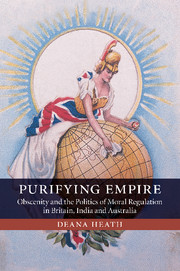Book contents
- Frontmatter
- Contents
- List of abbreviations
- Introduction: Books, boundaries and Britishness
- 1 Colonialism and governmentality
- 2 From sovereignty to governmentality: the emergence of obscenity regulation as a biopolitical project in Britain
- 3 Globalizing the local: imperial hygiene and the regulation of the obscene
- 4 Localizing the global in settler societies: regulating the obscene in Australia
- 5 Localizing the global in exploitation colonies: regulating the obscene in India
- Conclusion: Retangling empire, nation, colony and globe
- Bibliography
- Index
Conclusion: Retangling empire, nation, colony and globe
Published online by Cambridge University Press: 06 July 2010
- Frontmatter
- Contents
- List of abbreviations
- Introduction: Books, boundaries and Britishness
- 1 Colonialism and governmentality
- 2 From sovereignty to governmentality: the emergence of obscenity regulation as a biopolitical project in Britain
- 3 Globalizing the local: imperial hygiene and the regulation of the obscene
- 4 Localizing the global in settler societies: regulating the obscene in Australia
- 5 Localizing the global in exploitation colonies: regulating the obscene in India
- Conclusion: Retangling empire, nation, colony and globe
- Bibliography
- Index
Summary
Several years prior to the first Vizetelly trial, the impoverished autodidact and future sex-reform campaigner William James Chidley (1860?–1916) read a translation of Zola's Nana. Although Nana was by no means the first French novel that Chidley had read, nor even the first work by Zola (he had recently read L'Assommoir), it had a tremendous impact on him. As he records in his ‘Confessions’, a remarkable account of nineteenth-century sexuality:
Nana disturbed my diseased nerves, and showed me how much I had injured myself, what a strong hold lust had on me. I tried to become abstemious, and spoke to Ada [his common-law wife], asking her to help me, telling her I think or dream nothing but lust. She agreed willingly, for she was easily led, and I ceased to go in quite so heavily – for a time. But lust is a demon that can play a waiting game.
While the impetus behind the various attempts to regulate English translations of Zola's works in England, Australia and India was the belief that they undermined the self-governing abilities of their readers, for Chidley Nana in fact served to convince him that he needed to cultivate self-control in order to ensure his bodily strength and purity.
Chidley's path to attaining self-control was, however, long, torturous and intimately bound with reading. As an adolescent he became, he believed, ‘nervous and ill’ as a result of reading works such as Reynolds's Mysteries of Paris, Smollett's Roderick Random, and Shakespeare's works as masturbatory aids.
- Type
- Chapter
- Information
- Purifying EmpireObscenity and the Politics of Moral Regulation in Britain, India and Australia, pp. 206 - 213Publisher: Cambridge University PressPrint publication year: 2010



